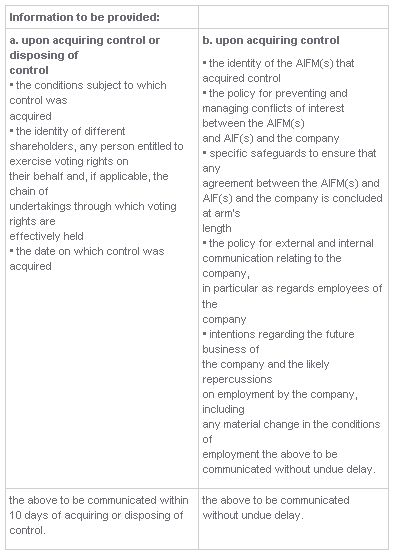Under the draft Regulations, when an AIF acquires control of a
non-listed company, the AIFM must use its best efforts to ensure
that the board of the company provides certain information to
employee representatives or, where there are none, to employees of
the acquired company.
The category of information in which employees will be most
interested is the AIF's intentions regarding the future
business of the company and the likely repercussions on employment
by the company, including any material change in the conditions of
employment. This is similar to information requirements introduced
into the UK Takeover Code following the Kraft/Cadbury takeover,
although does not go quite as far. It is designed to force
disclosure of significant planned changes, such as the closure of a
site, and would require notification of firm plans to change the
business that may affect employees adversely. Often, however,
post-acquisition plans are provisional and are subject to
assessment of business or individual performance, further
board
discussions, trading conditions and other factors and an AIFM would
probably be justified in not revealing details of plans of that
nature.
Breach of these obligations may result in a sanction being imposed by the FCA but does not add to the employment rights that individual employees or their representatives already have. Therefore, the motivation for an employee to claim that the AIF or AIFM has not complied is either to embarrass or to use the breach as evidence in support of an ordinary employment claim.
However, many employees will not even be aware of these
disclosure obligations unless they have employee representatives
who have experience of or training on them. The obligations fall
away if providing the information would seriously harm the
functioning of the company or would be seriously prejudicial to it,
which sets a high threshold for anyone looking to fall within the
exception.
There is a duty on employees and employee representatives who
receive the information to keep it confidential. However, normal
precautions should be taken to preserve confidentiality, such as
marking any written notification as confidential.
The draft Regulations contain no requirement for the notification
to be in writing, although written notifications will more readily
demonstrate compliance.

Share buybacks from employees
Under the proposed anti-asset stripping provisions in the
Regulations, within the period of 24 months following the
acquisition of control an AIFM may not facilitate, support
(including by voting in favour at a board meeting) or instruct any
distribution, capital reduction, share redemption or acquisition by
the company of its own shares unless certain financial tests are
met.
One relatively routine situation in which the new tests will apply
is where an employee who is a shareholder leaves or is dismissed
and the company wants to buy back their shares. This will not be
permissible if, in broad terms, the company's net assets as at
the end of the last financial year are less than the amount of the
subscribed share capital (plus non-distributable reserves) or would
become so as a result of the share acquisition. Such a situation is
far from impossible.
The Regulations thus impose an additional test on the company with which it will have to demonstrate compliance, in addition to the requirement under the Companies Act 2006 to have distributable profits out of which to purchase the shares. In our view, the wording of the anti-asset stripping regulations could benefit from some additional clarity. However, as the draft Regulations must implement similar wording the AIFM Directive, the scope for exceptions to be made by the UK government in the final Regulations is extremely small.
The content of this article is intended to provide a general guide to the subject matter. Specialist advice should be sought about your specific circumstances.
